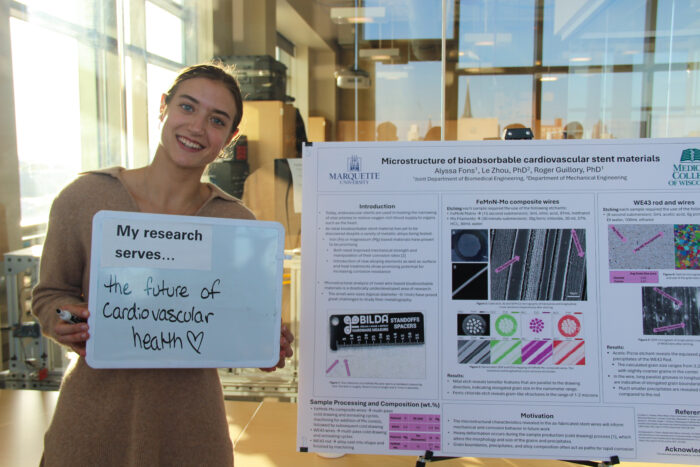Here is the report of published academic papers written by Marquette faculty and staff and submitted to the Office of University Relations for October 2024. These papers have appeared in print or been presented recently. This is the first installment and includes previously submitted papers.
If you have recently published a paper, or if you have one coming out, we would like to feature your publication in an upcoming Faculty in Print feature. More information on the submission process is available online.
Child custody cases now & then: From Kramer versus Kramer to Marriage Story
Dr. Alexandra Crampton, associate professor of social and cultural sciences | Family Court Review (Special issue–October 2024)
Abstract: In the 1970s, the movie Kramer versus Kramer dramatized the destructiveness of child custody disputes. It helped inspire family law reform and careers. The central problem identified was an adversarial system and hostile litigation. The proposed solution was alternative dispute resolution. Over time, these alternatives became an integral part of the family law response to child custody cases, except in cases of vulnerable parties. Today’s parents are under greater legal and social pressure to resolve disputes without resorting to court. This can be welcomed and resisted by parents. This article focuses on parental resistance to dispute resolution over litigation through a return to Hollywood. The movie Marriage Story is used to show how parents might feel alienated rather than relieved by opportunity to cooperatively problem-solve differences. Implications are explored in part through drawing from ethnographic research on parents who engaged in mediation through a U.S. family court program and through two Australian Family Relationship Centres.
Navigating the Complex Landscape of Ethical AI
Dr. Michael Zimmer, professor of computer science | NMDSI Insights (Sept. 29, 2024)
Abstract: AI technologies have the potential to revolutionize industries and improve quality of life, but they also pose significant ethical challenges including, bias and fairness, privacy and surveillance, and the need for transparency and accountability.
Prevalence of temporomandibular disorders (TMD) in obesity patients: A systematic review and meta-analysis
Dr. Luis Eduardo Almeida, clinical associate professor of dentistry | Journal Oral Rehabilitation (Volume 50, Issue 12, December 2023)
Abstract: Obesity is a growing epidemic in the world. It increases the risk for severe health conditions, including diabetes, heart disease and stroke. Recent research has found that obesity is associated with an increased risk for temporomandibular disorders (TMDs). The purpose of this literature review with meta-analysis is to analyze the possible association between obesity and temporomandibular disorders.
Autoregulatory mechanism of enzyme activity by the nuclear localization signal of lysine-specific demethylase 1 [Editor’s Pick]
Dr. Nick Reiter, assistant professor of chemistry | Journal of Biological Chemistry (Volume 300, Issue 9, September 2024)
Abstract: The N-terminal region of the human lysine-specific demethylase 1 (LSD1) has no predicted structural elements, contains a nuclear localization signal (NLS), undergoes multiple posttranslational modifications (PTMs), and acts as a protein-protein interaction hub. This intrinsically disordered region (IDR) extends from core LSD1 structure, resides atop the catalytic active site, and is known to be dispensable for catalysis. Here, we show differential nucleosome binding between the full-length and an N terminus deleted LSD1 and identify that a conserved NLS and PTM containing element of the N terminus contains an alpha helical structure, and that this conserved element impacts demethylation. Enzyme assays reveal that LSD1’s own electropositive NLS amino acids 107 to 120 inhibit demethylation activity on a model histone 3 lysine 4 dimethyl (H3K4me2) peptide (Kiapp ∼ 3.3 μM) and histone 3 lysine 4 dimethyl nucleosome substrates (IC50 ∼ 30.4 μM), likely mimicking the histone H3 tail. Further, when the identical, inhibitory NLS region contains phosphomimetic modifications, inhibition is partially relieved. Based upon these results and biophysical data, a regulatory mechanism for the LSD1-catalyzed demethylation reaction is proposed whereby NLS-mediated autoinhibition can occur through electrostatic interactions, and be partially relieved through phosphorylation that occurs proximal to the NLS. Taken together, the results highlight a dynamic and synergistic role for PTMs, intrinsically disordered regions, and structured regions near LSD1 active site and introduces the notion that phosphorylated mediated NLS regions can function to fine-tune chromatin modifying enzyme activity.
From forgiveness and reconciliation to social capital and psychosocial well-being: An evaluation of a multisite intervention in Colombia
Dr. Gabriel Velez, associate professor of educational policy and leadership | European Journal of Social Psychology (Volume 54, Issue 5)
Abstract: In 2016, the Colombian government signed a historic peace accord with the FARC-EP after 50 years of armed conflict. Still, widespread obstacles to forgiveness and reconciliation remained. The current study explores the potential of reconciliation centres (RC) in Medellin to help counteract a return to violence. These seven RCs included three branches of programming about forgiveness and reconciliation to support community well-being and social capital. A between-group analysis, as part of a quasi-experimental design, demonstrated no significant growth in participants’ understanding that restoration is different from reparation or awareness that reconciliation involves approaching the other to rebuild. There was enhanced acceptance that forgiveness is not forgetting and is a personal decision. While social capital increased, the perception that the community likes to help others and that community work benefits others decreased. The findings demonstrate the complicated relationships between reconciliation, community well-being and social capital, especially for community-level interventions in violent contexts.
Manywheres: In Pursuit of Social Justice in Developmental Science
Dr. Gabriel Velez, associate professor of educational policy and leadership | Human Development (Volume 68, Issue 2)
Abstract: In this article, we articulate an innovative framework, manywheres, and argue that it can advance the work of fostering youth-led change and progressive world-making. We first root psychological and development science in an applied framework of developing more just, harmonious, and tolerant social worlds. Then, we introduce manywheres, a guiding framework of propositions of attending to the complexity and nuance of meaning-making across individuals without becoming lost in nihilism, relativism, or ethnocentric views of social justice. This leads to the construction of a more holistic developmental lens considering the age-related, contextual, and internal factors that shape meaning-making individual trajectories and societal outcomes. Manywheres can thus structure thinking and research with an end goal of understanding the diversity of young people’s engagement, activism, and disconnection. We end with mapping a research agenda applying these ideals, incorporating the methodological approaches that can be taken, concrete examples, and implications that can be applied to salient social issues.
Immunohistochemical Analysis of Dentigerous Cysts and Odontogenic Keratocysts Associated with Impacted Third Molars—A Systematic Review
Dr. Luis Eduardo Almeida, clinical associate professor of dentistry | Diagnostics (Volume 14)
Abstract: This systematic review investigates the diagnostic, prognostic, and therapeutic implications of immunohistochemical markers in dentigerous cysts and odontogenic keratocysts associated with impacted third molars.



